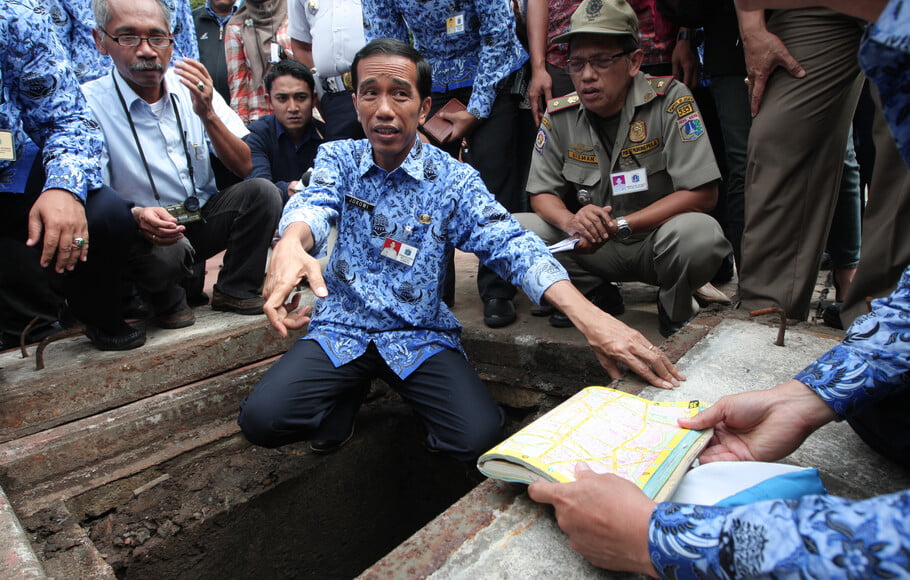
DKI Jakarta Governor Jokowi invited the Supreme Audit Agency (BPK) to audit the implementation of the Jakarta Healthy Card (KJS) program which has been rolling for one year. This was done by Jokowi so that the DKI Regional Government would get a second opinion on the implementation of the KJS program, which has never received an inspection report submitted by the DKI Jakarta Inspectorate. The Center for Regional Research and Information (PATTIRO) considers that the steps taken by Jokowi by inviting BPK are actually the right ones, however, in order for the KJS program to continue to run effectively and on target, it is best if the community as beneficiaries of KJS is also involved in auditing the KJS program. The community can be involved as an auditor for the KJS program by using a citizen report card (CRC).
CRC is one of the tools (tools) to collect assessments about a public service by users of these public services, as well as disseminate reassessment information to service users as well as public service providers. The public services assessed include the availability, access, and quality of services received. Apart from evaluating the results of the CRC from citizens about the public services they receive, they will also encourage changes to improve services through recommendations.
CRC was first initiated by the Public Affairs Center (PAC) India in 1994 by Samuel Paul which aims to improve urban governance in India. Today the CRC has become a statistically powerful measuring instrument used as a stimulus and pressure to influence local bureaucrats and elected officials in various cities in India. Based on the situation and initiatives developed by PAC and civil society organizations (CSOs) in Indonesia in carrying out CRC including PATTIRO, PATTIRO developed the CRC method by encouraging community participation in addressing the problem of the relationship between the community as a user and the government as a provider of public services. This community participatory method is expected to be able to improve the fulfillment and quality of public services so that they are received by the community in a fair and quality manner. It is hoped that the participatory approach will also be able to accommodate community needs, side with the poor, the needs of marginalized groups and be more gender responsive.
The CRC method developed by PATTIRO in auditing a public service consists of three stages, namely the preparation stage, the implementation stage, as well as the data analysis stage and results dissemination. At the preparatory stage, an assessment is made of whether it is appropriate for the CRC to be held, determining the implementing agency/team, identifying and exploring problems and actors in the delivery of public services, and designing survey instruments. At the implementation stage, survey activities were carried out to collect and verify data. At this stage data processing is also carried out. For the stages of data analysis and dissemination, discussions were held to discuss the outline of the findings, analyze the data, prepare reports on survey results, and disseminate survey results. Dissemination of survey results was carried out to convey CRC results to stakeholders or parties related to CRC. This dissemination activity is also part of advocacy for service providers by providing recommendations for improving the quality of public services provided.
For the KJS program that was rolled out by the DKI Jakarta Provincial Government a year ago, CRC can be used as a complement to the audit conducted by the BPK. If the audit conducted by the BPK will only touch on the effectiveness of the KJS program implementation in terms of the use of the financial budget based on reports from the KJS program organizers, then CRC will provide input (recommendations) from the public as users of the KJS program, regarding how the KJS program has been running for one year . Has it been effective, have the recipients of the KJS program been right on target, have the benefits been felt by all the poor and marginalized people in Jakarta, has the mechanism been good, and so on. The implementation of an audit with the CRC will also provide advocacy to the DKI provincial government in implementing the KJS program and will encourage the situation for improving the KJS program which provides optimal service quality for Jakarta residents, is effective and on target.
The problem is that the implementation of a CRC audit requires a lot of money. However, in order to provide better, more effective, well-targeted and sustainable quality public services, the DKI provincial government must budget funds for the CRC audit. To save costs incurred, it is better if the CRC audit is not only carried out for one program that is rolled out. The CRC audit can be carried out simultaneously to audit all the “New Jakarta” programs that have been rolled out by the Jokowi – Ahok pair for this one year. (***)
Jakarta, 13 November 2013
Sad Dian Utomo | executive director
saddian@pattiro.org | 0812 800 3045
Contact Person: Adnan Rahmadi | Communications Officer
adnan@pattiro.org | 081 808 240105
The Regional Research and Information Center (PATTIRO) is a non-profit organization that encourages the realization of good, transparent and fair local governance for the social welfare of the community. PATTIRO, which was founded on April 17, 1999 in Jakarta, is engaged in research and advocacy with a focus on local governance issues, especially decentralization. PATTIRO’s focus areas consist of public service delivery improvement; public policy reform (public policy reform); and public budget management reform (public finance management reform).
(for details please see www.pattiro.org)




